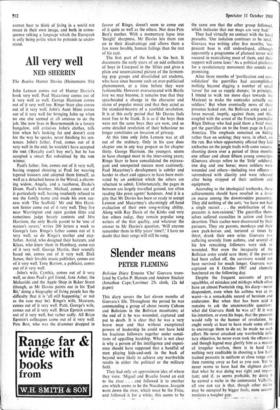All very well
NED SHERRIN
The Beatles Hunter Davies (Heinemann 30s) John Lennon comes out of Hunter Davies's book very well. Paul Macartney comes out of it very well as well. George Harrison comes out of it very well too. Ringo Starr also comes out of it very well. John's Aunt Mimi comes out of it very well for bringing John up when no one else seemed at all anxious to do the job. She now lives in Bournemouth in a luxury bungalow, still criticises John's clothes, tells him when he's looking fat and doesn't care for the way he speaks, never finishing his sen- tences. John's father, Fred, comes out of it very well in the end; he wouldn't have accepted the MBE CRoyalty can't buy me'), but he has accepted a smart flat subsidised by the MBE winner.
Paul's father, Jim, comes out of it very well, having stopped shouting at Paul for wearing tapered trousers and adopted them himself; as well as a detached house in the Wirral, a charm- ing widow, Angela, and a racehorse, Drake's Drum. Paul's brother, Michael, comes out of it particularly well, having resolutely refused to use the family name and made his own suc- cess with 'The Scaffold.' Mr and Mrs Harri- son Senior come out of it very well. They live near Warrington and open garden fetes and sometimes judge beauty contests and Mrs Harrison, the only Beatle parent to be 'one of nature's ravers,' writes 200 letters a week to George's fans. Ringo's father comes out of it very well; so do Ringo's mother and step- father. Astrid, who designed their haircuts, and Klaus, who knew them in Hamburg, come out of it very well. George Martin, their soundly based MD, comes out of it very well. Dick James, their lovable music publisher, comes out of it very well. Tony Barrow, a publicist, comes out of it very well.
John's wife, Cynthia, comes out of it very well, so does Paul's girl friend, Jane Asher, the Maharishi and the Apple Shop in Baker Street (though, as Mr Davies points out in his 'End Bit,' doing a biography of living people has the difficulty that it is 'all still happening,' or not as the case may be). Ringo's wife, Maureen, comes out of it very well. Patti, George's wife, comes out of it very well. Brian Epstein comes out of it very well, but rather sadly. All Brian Epstein's colleagues come out of it very well. Pete Best, who was the drummer dropped in favour of Ringo, doesn't seem to come out of it quite as well as the others. Nor does Pete Best's mother. With a momentary lapse into `Insight' sharpness, Mr Davies lets them run on to their disadvantage and allows them a few more lovable, human failings than the rest of his cast.
The first part of the book is the best. It documents the early years of an odd collection of boys in Liverpool in the 'fifties and gives a plain and unsensational picture of the ferment- ing pop groups and dissatisfied art students, who have since become such an over-publicised phenomenon, at a time before they were fashionable. However oversaturated with Beatle lore we may become, it remains true that they spearheaded a change in the character and status of popular music and that they acted as the standard-bearers of a youthful revolution. It is at this early period that Mr Davies feels most free to be frank. It is as if the boys then were not the same boys they are now, and so some detailed revelation of their behaviour no longer constitutes an invasion of privacy.
At this time only John Lennon was at all out ,of the ordinary. Only in his case does chapter one in any way prepare us for chapter thirty. George Harrison, the youngest, seems to have changed most in the intervening years; Ringo Starr to have consolidated the extrava- gant and unexpected success most cautiously. Paul Macartney's development is subtler and harder to chart and appears to have been moti- vated by an ambition which the others are reluctant to admit. Unfortunately, the pages in between are largely travelled ground, too often reading like press agents' handouts. And it is a pity that Mr Davies has been so ready to accept Lennon and Macartney's charmingly off-hand evaluation of their own song-writing ability. Along with Ray Davis of the Kinks and very few others today, they remain popular song writers of the first quality, and whatever the answer to Mr Davies's question, Will anyone remember them in fifty years' time?,' I have no doubt that their songs will still be sung.






































 Previous page
Previous page